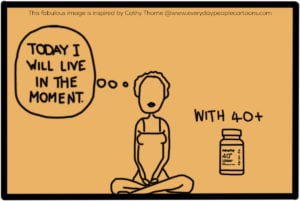Yes, It’s True. Dizziness At Perimenopause Is Common

Dizziness? Vertigo? Disequilibrium? Have you awarded them with the banner of unwelcome visitors?
We agree, you’re absolutely right! They’re definitely not fun rides on this rollercoaster known as perimenopause / menopause.
And if that last word – disequilbirum – sounds unfamiliar, you’re not alone.
But try breaking it up so it becomes dis-equilibrium. We’d wager equilibrium’s far more familiar to loads of you. – it means a state of balance.
And disequilibrium is the opposite – unbalanced – and it’s a close relation of dizziness and vertigo.
The three go hand in hand for our purposes.
Why?
Because they’re very common occurrences during perimenopause.
When I thought about it, I realised dizziness had been one of my first signs of perimenopause although I had no idea at the time.
I remember it well though. What’s more, I was speaking with a naturopath friend on the ‘phone when I had a dizzy spell. When I mentioned it to her she said I’d probably moved too quickly. (I was on the bed lying down and sat up.) Even wearing her naturopath hat she didn’t connect the dots with dizziness at perimenopause, and I certainly didn’t.
What do ‘the dizzies’ feel like?
The sensation of dizziness can be a feeling that everything is spinning, a loss of balance or feeling as if you’re going to faint. Indeed, it may occur as the result of another peri sign such as a panic attack or anxiety. Subsequently, your breathing and heart rate levels become rapid, disturbing the flow of blood and oxygen to the brain.
There are three types of dizziness at perimenopause:
- Lightheadedness – when you feel a bit woo woo or faint.
- Vertigo – when the room feels like it’s spinning.
- Disequilibrium – when you feel unbalanced or unsteady on your feet.
What causes dizziness/vertigo during perimenopause?
That’s the $64,000 question!

Researchers don’t fully understand the connection. It could simply be a part of ageing. But issues linked with the hormonal fluctuations of midlife to do with the middle ear, blood sugar levels, and migraines may also be a cause.
It’s not news that the reproductive hormones estrogen, progesterone and testosterone change a heck of a lot during perimenopause. As a result, many bodily functions including the aforementioned as well as blood pressure, circulation, blood vessels, stress response and the cardiovascular and nervous systems can be affected.
Estrogen (estradiol) keeps all of these things ticking along nicely premenopause, but hormonal fluctuations can create havoc and bring on ‘the dizzies’. Moreover, estrogen also keeps many brain processes regulated via the HPATG (hypathalamus-pituatary-thyroid-gonads) axis. But when hormonal levels decline it can make the poor ole’ thing feel a little bewildered. And the next thing you know? Dizzy spell.
Are you getting the picture? ‘The dizzies’ are rather a complicated issue. So let’s take a look at some of the common menopause-related causes.
Body temperature surges
Yes, those pesky blinkin’ things. Something like 80 percent of women going through the meno years experience hot flushes. If you can relate then you clearly understand why they’re crazy-making. To explain further, this study talks about the link between body temperature and menopause-related dizziness. Additionally, research has shown that women who experience fluctuations in body temperature may also be more prone to feelings of dizziness or vertigo.
Migraines
We’ve heard from many in our treasured community who suffer from hormonal headaches or migraines. And while we always dislike being the bearers of bad news they can be triggered by perimenopause. Furthermore, if you have a past history they may even become worse. Indeed, if you’ve ever experienced a doozy you don’t need us to tell you dizziness can be a side effect.
Fatigue
There are not too many of us (I’d venture to say none) who haven’t gone without our full quota of sleep at least once in our lives. Therefore it’s pretty safe to say that we know how fatigue can make us feel off the planet. And because sleep issues and insomnia are a menopausal issue it’s not difficult to see why this could be a contributing factor.
Blood sugar
Our blood sugar levels are closely linked with our hormones. Moreover, the estrogen and progesterone changes of perimenopause/menopause can have a direct effect on our body’s response to insulin. Consequently, this can lead to unstable blood sugar levels, which in turn leads to dizzy moments.
The middle ear factor
Most of us don’t realise that female hormone changes can affect our inner ears aka as the vestibular system. It’s why one of the signs of peri/menopause can be tinnitus or an incessant ringing in the ears. In addition, this area of the body is critical to our sense of balance. So it makes sense that if all is not well vertigo or disequilibrium may be the result.
Ageing
As mentioned earlier, while ‘the dizzies’ may be due to hormonal factors they could also simply be a sidekick of ageing. Furthermore, they’re more prevalent in both older men and women though the incidence is more common in women. Therefore, more research is needed to discover why.
When will it end?
Happy dance! We have good news :-). Dizziness at perimenopause should only last through to the menopause transition. Once you reach post-menopause it should stop. One caveat though: since episodes can occur for other reasons they may still be an unwelcome visitor.
Did you know? Simple dehydration can cause dizziness so ensure you’ve drunk your H2O.
What can you do for dizziness at perimenopause?
A few simple precautions could nip your dizzies in the bud if they’re for minor reasons:
- Ensure you’re well hydrated. This is even more crucial when your body’s going through the changes of the menopause years. At least eight glasses a day should keep you well topped up. Herbal teas are great too, particularly in cooler seasons.
- Try ginger tea. It’s super tasty and anti-inflammatory which is helpful if you suffer joint and muscle pain. Simply grate fresh ginger and steep it.
- Eat well and eat regularly to keep your blood sugar levels nice and stable.
- Choose proteins like nuts and eggs and combine them with healthy fats.
- Avoid processed and refined foods particularly the ‘whites’ like sugar and flour.
- Relax. We can’t say it often enough. We’re such stress bunnies today. Certainly, it’s usually for good reason so if you can take some you-time please do. Just 15 minutes of deep breathing or mindfulness will repay you in spades.
- Support your hormones with Merry Peri® or Perky Post® They’re an evidence-based blend of nature and science. See more below.
NB: If you’re feeling dizzy it’s best to check in with your doctor. There are many different possible reasons such as a sinus or viral infection, low blood pressure, low iron or simply being dehydrated or hungry












Thanks for this info. In relation to tinnitus – I have had it for years but after reading this I actually realise that in the last few months with peri-menopause coming on it has actually lessened. The “quiet” then loud “ringing” at intervals throughout the day that I had got used to only happens rarely now. Weird. Also in the last couple of years I have started to notice I get vertigo – never had it before. But was riding my ATV along a narrow ridge on a neighbours farm a couple of years back and suddenly everything started going a bit “blurry” had to stop the bike, then back back off ridge and take the long way around. This female thing is no fun!!!
Hi Tracy, that is weird that your tinnitus should lessen. That must have been frustrating for you as my cousin had it and she found it very difficult to cope. Agreed, this female thing can be challenging! Thanks for sharing your experience, it’s so helpful to others :-).